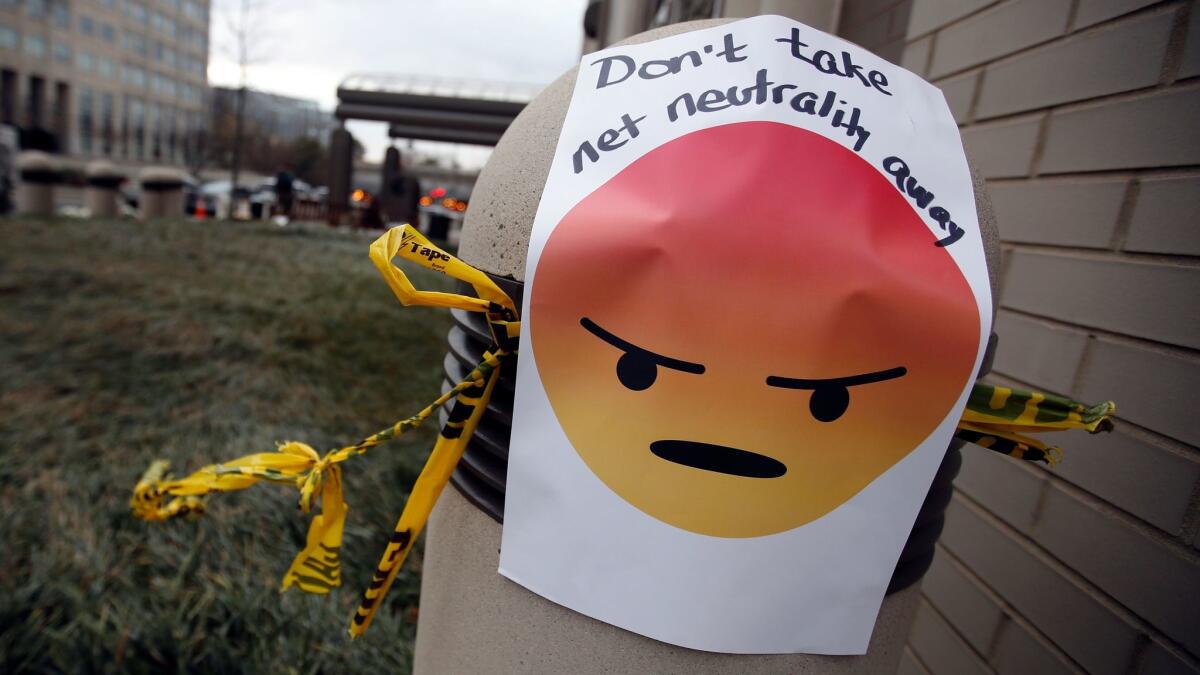Opinion: Can the free market help fix the FCC’s net neutrality screw-up?

The Federal Communications Commission’s decision to repeal its net neutrality rules will be contested in the courts and in some state legislatures, where lawmakers are trying to enact their own protections for the free and open internet. But the more promising battleground is in the marketplace, where upstart broadband providers may try to attract customers by pledging not to meddle with their customers’ data traffic.
Here’s one example: Starry, a new service that uses ultra-high-frequency wireless signals to deliver exceptionally fast connections, pledged last month not to block or degrade its customers’ data, and not to prioritize any content, applications or services. “You literally can’t pay us to do this,” the company’s chief executive, Chet Kanojia, wrote in a blog post.
FCC Chairman Ajit Pai and his GOP allies on the commission have argued that broadband providers could use paid prioritization — that is, creating fast lanes for favored content or service providers — to introduce new services, reduce the cost of broadband access and/or pay for network upgrades. But Starry is betting that the thing internet users want most is what they have today: an experience controlled by them, not shaped by their internet service provider.
That looks like a smart bet, considering the overwhelming support that polls have shown for net neutrality rules. This sentiment has led some big internet providers, such as Comcast, to make similar pledges to protect net neutrality. Starry goes further than its rivals, saying it won’t slap a monthly cap on the amount of data its customers can use — a key commitment in an era of bandwidth-intensive streaming and ultra-high-definition video.
Granted, companies can always change their corporate minds. That’s why some states are pursuing their own regulations on broadband providers — for example, California Senate President Pro Tem Kevin de León offered legislation this week to essentially write the previous FCC neutrality rules into California law.
States traditionally have regulated local communications services while the feds have jurisdiction over interstate services, and broadband access services merely provide a local on-ramp to the global Internet. So there’s some logic to de León’s proposal. One problem, though, is that the FCC has repeatedly declared broadband access services to be interstate in nature, and it has preempted state and local rules that are inconsistent with its own.
Harold Feld of Public Knowledge, a consumer advocacy group, believes the FCC’s latest move opened the door to state regulation of broadband ISPs. When it repealed its neutrality rules, Feld said, the FCC ruled that Congress had not given it any authority to regulate internet providers. “You can’t on the one hand claim to have no authority but on the other hand claim to retain sufficient authority to preempt the states,” Feld said.
Still, it’s a safe bet than any attempt by California or other states to impose neutrality rules on broadband providers would wind up in court. That’s why it’s important that upstarts like Starry try to seize the opportunity to differentiate themselves with neutrality pledges.
Starry, which was co-founded by the entrepreneur behind the defunct TV-over-the-internet start-up Aereo, offers service only in parts of Boston, but on Thursday it announced that it was rolling out service to selected parts of Los Angeles and Washington, D.C., as well. It plans to launch in 14 other major U.S. cities later this year.
It’s one of the first of a new wave of “5G” wireless services that use high-frequency airwaves to bring internet connections to apartments, commercial buildings and homes. The technology is capable of delivering so much bandwidth wirelessly — Starry offers 200 megabits per second downstream and upstream — that it’s a real alternative to cable modems and DSL services. Only a handful of 5G deployments are expected this year, however, so the vast majority of consumers will be stuck with only one or two options for broadband for the foreseeable future.
Twitter: @jcahealey
More to Read
A cure for the common opinion
Get thought-provoking perspectives with our weekly newsletter.
You may occasionally receive promotional content from the Los Angeles Times.







